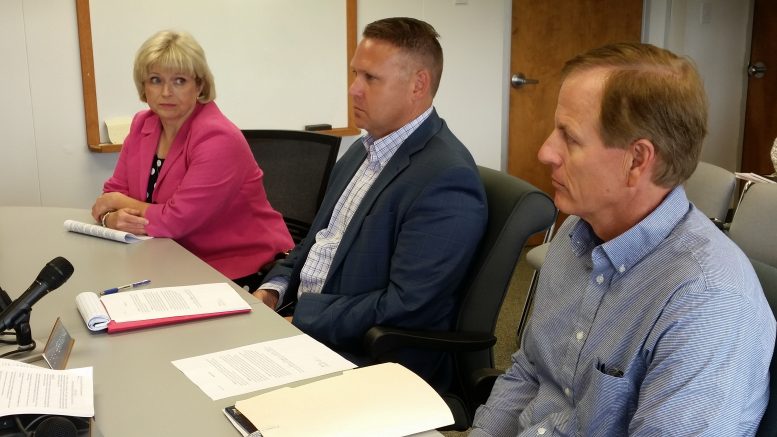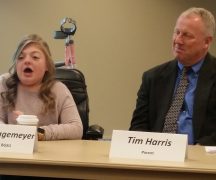By JAN LARSON McLAUGHLIN
BG Independent News
Wood County voters will decide the fate of two county-wide levies this fall. The county commissioners heard from both groups last week.
One levy is a reduced renewal levy – dropped from the current 2.95-mills to 2.45 mills for Wood County Board of Developmental Disabilities.
The other is still a mystery. A request had been made for an increase from a 1-mill to a 1.3-mill levy for Wood County Alcohol, Drug Addiction and Mental Health Services.
The commissioners seem to be on board with the Wood Lane request. But they have expressed reservations about the increased levy request from ADAMHS.
During the presentation by Wood Lane officials, Superintendent Brent Baer talked about the “dynamic growth in services” that the board is seeing. And Martha Woelke, of the board, said great deliberation went into the levy request.
“We did everything we can to maximize state and federal money,” she told the commissioners.
The board has been able to reduce its levy collections some years, but feels that 2.45 mills is the lowest it can go for the renewal.
When people with developmental disabilities waive their right to institutional care, they are picked up by community based services – like Wood Lane. That agency then identifies their needs and develops plans to meet them, Baer said.
The waivers allow for federal funding, but the community agency must still pick up 40 percent of the costs, said finance officer Steve Foster.
“Our commitments are for the life of an individual,” Baer said.
Demands are growing as the population here is increasing. “Wood County is one of the few counties in Ohio that’s growing,” Baer said.
About five years ago, there were 226 consumers on waivers. Now there are 425. Baer expects that number to double again in the next five years.
The board may need to be back in five years, asking for a greater levy, but this should do for now, Baer said.
It’s not often that a county board approaches the county commissioners about lowering a levy request.
“I’ve never had to do one with a reduction,” said Sandy Long, the clerk of the board of commissioners.
The commissioners like the idea of asking taxpayers for less for Wood Lane. But they aren’t completely sold on asking taxpayers for more for the Wood County Alcohol, Drug Addiction, and Mental Health Services Board.
The Wood County Commissioners – who have to certify the need for levies before they are placed on the ballot – have asked the ADAMHS board to consider other options for the November ballot issue.
The current 1-mill levy generates about $2.9 million. The levy replacement plus addition of 0.3 mills would bring in an additional $1.3 million.
According to a letter last month from Wood County Administrator Andrew Kalmar to ADAMHS Executive Director Tom Clemons, the commissioners aren’t rejecting the request for the 1.3-mill levy. However, they would like the ADAMHS Board to consider other options.
Those options, according to the letter, plus the original request are:
- 1.3-mill replacement levy for 10 years, which would cost the owner of a home valued at $100,000 approximately $45.50 a year.
- 1-mill replacement levy for 10 years, which would cost the owner of a home valued at $100,000 about $35 a year.
- Replacement levy at an amount between 1 mill and 1.3 mills for 10 years.
- Two separate levies, with one being a 1-mill replacement levy for 10 years, plus a new levy of 0.3 mills for five years. That lower levy would cost the owner of a home valued at $100,000 about $10.50 annually. If the opiate crisis is still creating a big demand for services after five years, the ADAMHS Board can put that small levy back on the ballot, the letter stated.
Clemons said the additional funding is needed to keep up with growing needs for services. Some of the biggest issues include dealing with the opiate epidemic, providing more mental health housing, and improving crisis intervention services.
Clemons said on Tuesday that his board is continuing to meet to discuss levy options. He is hoping to find a levy amount that his board and the commissioners can support.
“We have to work in unison” to get the levy passed, he said.





